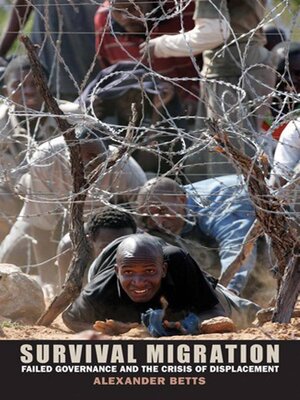
Sign up to save your library
With an OverDrive account, you can save your favorite libraries for at-a-glance information about availability. Find out more about OverDrive accounts.
Find this title in Libby, the library reading app by OverDrive.



Search for a digital library with this title
Title found at these libraries:
| Loading... |
International treaties, conventions, and organizations to protect refugees were established in the aftermath of World War II to protect people escaping targeted persecution by their own governments. However, the nature of cross-border displacement has transformed dramatically since then. Such threats as environmental change, food insecurity, and generalized violence force massive numbers of people to flee states that are unable or unwilling to ensure their basic rights, as do conditions in failed and fragile states that make possible human rights deprivations. Because these reasons do not meet the legal understanding of persecution, the victims of these circumstances are not usually recognized as "refugees," preventing current institutions from ensuring their protection. In this book, Alexander Betts develops the concept of "survival migration" to highlight the crisis in which these people find themselves.
Examining flight from three of the most fragile states in Africa—Zimbabwe, the Democratic Republic of Congo, and Somalia—Betts explains variation in institutional responses across the neighboring host states. There is massive inconsistency. Some survival migrants are offered asylum as refugees; others are rounded up, detained, and deported, often in brutal conditions. The inadequacies of the current refugee regime are a disaster for human rights and gravely threaten international security. In Survival Migration, Betts outlines these failings, illustrates the enormous human suffering that results, and argues strongly for an expansion of protected categories.
|International treaties, conventions, and organizations to protect refugees were established in the aftermath of World War II to protect people escaping targeted persecution by their own governments. However, the nature of cross-border displacement has transformed dramatically since then. Such threats as environmental change, food insecurity, and generalized violence force massive numbers of people to flee states that are unable or unwilling to ensure their basic rights, as do conditions in failed and fragile states that make possible human rights deprivations. Because these reasons do not meet the legal understanding of persecution, the victims of these circumstances are not usually recognized as "refugees," preventing current institutions from ensuring their protection.In this book, Alexander Betts develops the concept of "survival migration" to highlight the crisis in which these people find themselves. Examining flight from three of the most fragile states in Africa—Zimbabwe, the Democratic Republic of Congo, and Somalia—Betts explains variation in institutional responses across the neighboring host states. There is massive inconsistency. Some survival migrants are offered asylum as refugees; others are rounded up, detained, and deported, often in brutal conditions. The inadequacies of the current refugee regime are a disaster for human rights and gravely threaten international security. In Survival Migration, Betts outlines these failings, illustrates the enormous human suffering that results, and argues strongly for an expansion of protected categories.






